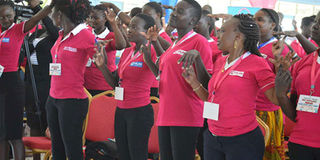16 days aren’t enough to put a stop to GBV

Women in Kisumu participate in the inaugural Kisumu County Girls' Summit, in line with the 16 Days of Activism against Gender-Based Violence campaign, at Tom Mboya Labour College on November 27, 2018. The campaign initiated 28 years ago by activists seems not to have borne much fruit. PHOTO | FILE | NATION MEDIA GROUP
What you need to know:
- In recent years, the drive for change has garnered more visibility through the determination of activists and survivor advocates.
- It’s time to go beyond speeches and posters and consider better funding of rape crisis workers and social workers.
Today marks the first day of “16 Days of Activism against Gender-Based Violence”, an annual international campaign that focuses on eliminating violence against women and girls. The 16 days run-up to December 10.
However, the campaign initiated 28 years ago by activists seems not to have borne much fruit.
For long, impunity, silence, stigma and shame have fuelled gender-based violence (GBV) to alarming levels. Victims fear speaking out, exacerbating this human-rights violation to egregious levels.
Ending GBV and ensuring safety for women and girls is achievable and should be topmost on the minds of the government, institutions, communities and individuals.
It is true that men, too, are physically, emotionally and financially abused.
However, we should not be distracted from glaring evidence that most abuse is inflicted and perpetrated by men. Statistics show that one in every three women experiences domestic violence in her lifetime.
MALE PERPETRATORS
In Kenya, we are not about to end this scourge. The media covers an endless stream of horror stories — of women beaten up to a pulp and killed by their male partners, and of innocent children murdered in the most brutal of ways.
Joyce Syombua and her two children were recently brutally murdered and their bodies buried in a shallow grave in Nanyuki.
The perpetrator is allegedly her estranged husband. In Nakuru, Faith Wangui disappeared after visiting her estranged lover. Her decomposing body was found in the Menengai Crater.
Then there is Monica Kimani, Sharon Otieno, Ivy Wangeci and many others, who have died under similar circumstances. In all these deaths, the major suspect has been a boyfriend or husband.
According to an article in the Saturday Nation’s Saturday Magazine, men have killed eight women every month over the past 11 months.
It further states that 25 women were murdered by men between January and February this year alone. And that between January and May, 46 women were victims of femicide.
The figure rose to 82 cases of reported femicide by November 16. Our country has become a crime scene and a never-ending horror story.
CHANGE APPROACH
Even though we need the 16 Days of Activism campaign (it is better than nothing), one is left wondering what its point is in the first place.
In recent years, the drive for change has garnered more visibility through the determination of activists and survivor advocates. More organisations, women, men and policies have come together to end GBV.
Globally, campaigns such as the #MeToo and #TimesUp and women’s marches across cities in Africa, among other movements, have rallied public outcries against the scourge.
Kenyan university students also recently launched the #CampusMeToo campaign against sexual harassment on campuses.
The approach to the campaign ought to change if we want to see change.
The government should commission a study to determine the campaign’s effectiveness.
POLITICAL WILL
It’s time to go beyond speeches and posters and consider better funding of rape crisis workers and social workers.
GBV desks at police stations should be enhanced by empowering those who man them. The Protection against Domestic Violence Act should also be fully enforced.
The government should allocate money to support women in abusive relationships and ensure they have a safe place to go where they can heal, pick themselves up and move on.
Speaking up against GBV is not an option if we are to uproot it from our families, communities and societies.
Women and girls must be encouraged to speak up about their experiences and create awareness of the magnitude of the problem.
Dorcas Odumbe is the gender editor at NMG; dmuga @ke.nationmedia.com




